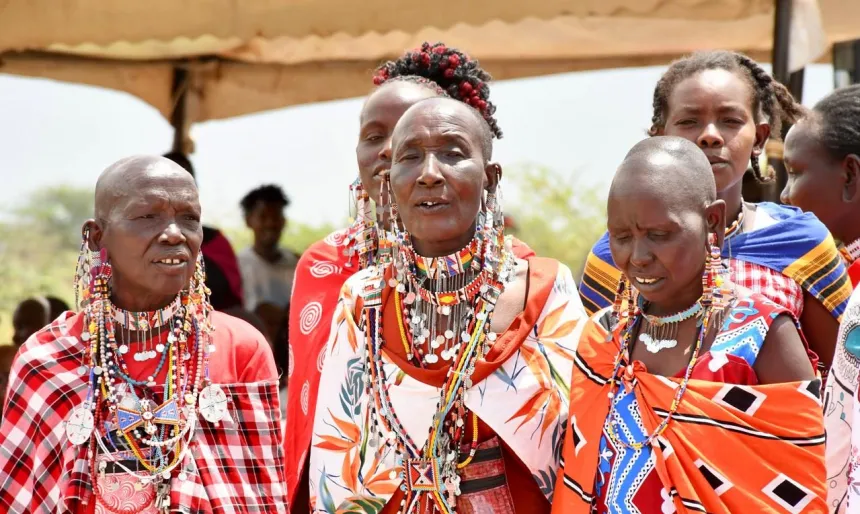Under the expansive skies of Kajiado County, Elizabeth Lekanet sits outside her home in Olorien village, her fingers carefully weaving colourful beads into intricate patterns. Each bead carries the wisdom of generations, a story deeply woven into the rich tapestry of Maasai tradition, passed down from mother to daughter.
Just a few years ago, beadwork was merely a pastime activity for Lekanet, something done in between household chores, offering little promise of financial security. But today, thanks to the Ushanga Kenya Initiative, it is her livelihood, her empowerment, and her gateway to a better future.
A mother of four, Lekanet recalls how she once struggled to provide for her family. Farming, her primary source of income, was unreliable, and occasional bead sales barely covered her children’s school fees or daily meals. Every day was a battle against uncertainty, with hope feeling more distant as time passed.
“Before Ushanga was launched in Kajiado, many women here struggled with no reliable source of income or market for our beadwork. For me, putting food on the table for my children was an uphill task,” she says.
She credits the Ushanga Kenya Initiative with transforming the livelihoods of women in the region. The program offers training in modern beadwork techniques, business management, and digital marketing, equipping artisans with the skills needed to commercialize their craft.
“We have benefited a lot from Ushanga. We’ve learned how to use machines to string beads faster and more efficiently to ensure that our beadwork meets international market standards,” she says.
Beyond refining their craft, women in the program also learn how to market their products digitally, create social media pages, and take high-quality photographs to attract global customers.
Lekanet now sells her handcrafted accessories locally and internationally, reaching buyers directly without relying on the middlemen who had once profited from her labor.
Her earnings now support her children’s education, provide consistent meals, and give her the dignity of financial independence. What was once a quiet craft practiced as tradition has now become a force of empowerment, a livelihood woven into every bead she threads.
Similarly, Agnes Naikuni, a widow from Maparasha village, had spent years creating intricate beadwork only to sell it for far below its true value. Like many women, she fell victim to middlemen who exploited artisans, buying their work cheaply and reselling it at premium prices elsewhere.

Through Ushanga Kenya, she learned to market her craft directly, cutting out intermediaries and increasing her earnings. The government-backed initiative links women to both local and international markets, ensuring they reap maximum benefits from their craft.
Today, Naikuni’s beadwork is shipped across Kenya and beyond, and the income she generates allows her to provide for her children.
“We used to sell a bracelet for fifty shillings, not knowing that the same piece could be worth thousands abroad,” she says, reflecting on how much her perspective has changed.
As part of its effort to eliminate exploitation by middlemen, Ushanga Kenya is urging more women to join cooperatives so they can be directly linked to buyers and markets without relying on intermediaries. This step ensures that women control pricing, maximize profits, and secure stable livelihoods.
Across Kajiado County, cooperatives have become vital engines of economic empowerment, enabling artisans to access funding, pool resources, and negotiate better prices for their products.
These cooperatives also serve as structured channels through which women can access training, business mentorship, bulk raw materials at reduced costs, and participate in exhibitions and trade fairs at county, national, and international levels.
At a recent Ushanga Kenya beadwork training session held in Olorien, Gladys Moses, Chairlady of the Elaroi Women Group, passionately urged fellow women to embrace the cooperative societies. She emphasized that such societies are more than just business groups; they are safe spaces for shared learning, financial inclusion, and community resilience.

“For too long, women have worked in isolation, selling their crafts at low prices and being taken advantage of by brokers. Cooperatives give us the power to set fair prices, power to access funding, and power to grow together,” said the Chairlady.
Through the cooperatives, the women can open group bank accounts, save consistently, and qualify for loans that can be used to expand their businesses or address personal needs like school fees or medical care. Some groups have even established rotational savings (chamas) within the cooperatives, fostering a culture of accountability and support.
The Ushanga Kenya Initiative, a national government flagship project established in 2017, was created to empower pastoralist women involved in beadwork, transforming their traditional art into valuable, marketable commodities. Targeting seven counties—Turkana, Samburu, Kajiado, Narok, Baringo, Marsabit, and West Pokot—the initiative aims to strengthen business and production capacity, making beadwork competitive in local, regional, and international markets.












